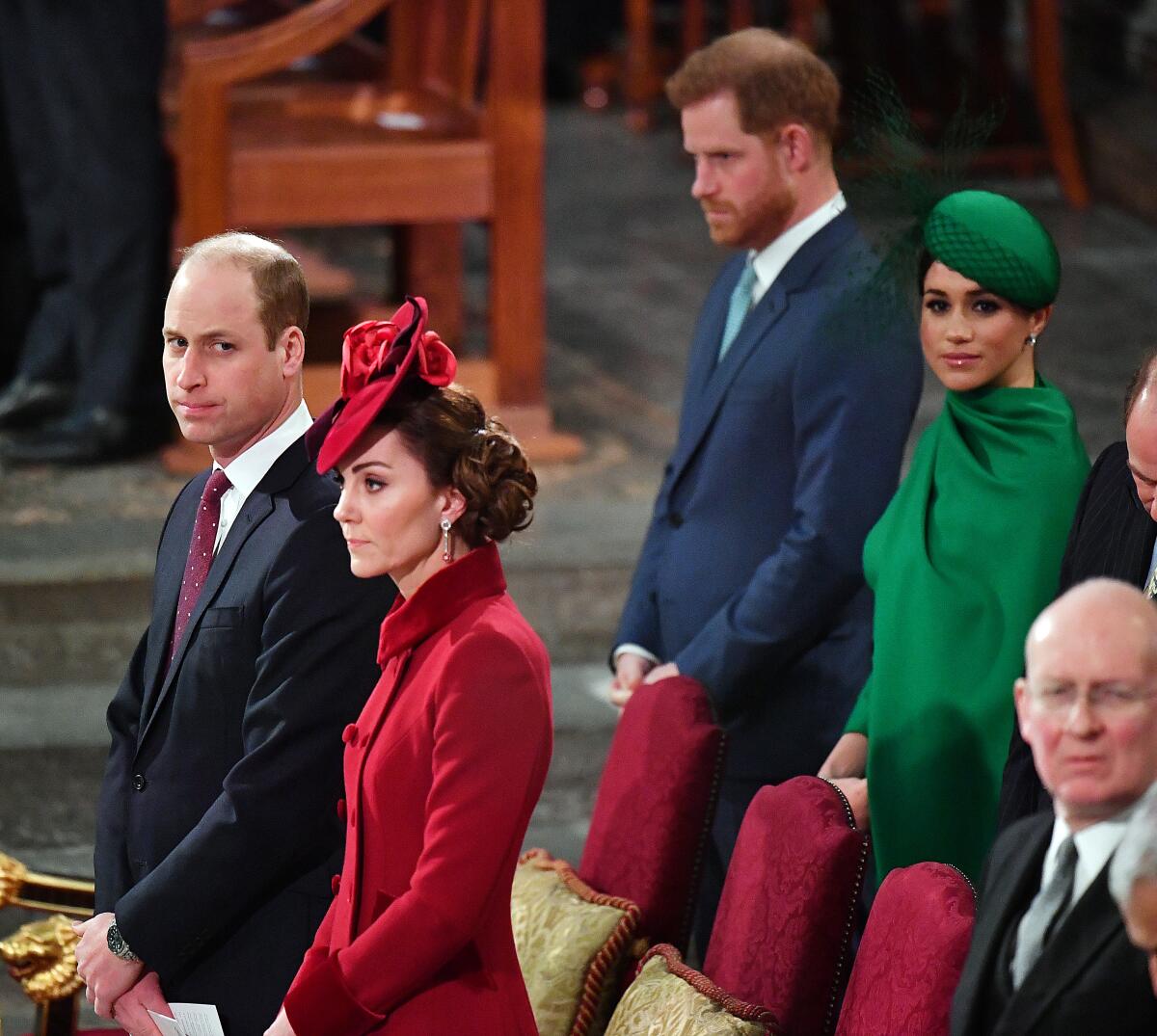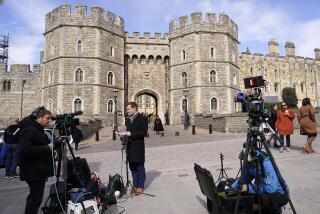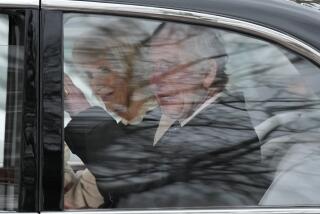Britain watches, wonders: Will brother princes make peace while grieving grandfather’s death?

LONDON — A popular prince’s return. Two brothers, once close but now estranged. A grandmother in deep mourning for her spouse of more than seven decades. A strait-laced father whose open grief over his own father’s passing provides a rare glimpse of his inner life.
Yet again, life imitates “The Crown.”
For the record:
12:28 a.m. April 15, 2021A previous version of this story misstated the relationship between Britain’s Princess Eugenie and Prince Harry. She is his cousin, not his niece.
Saturday’s funeral of Britain’s Prince Philip, husband of Queen Elizabeth, will at once be a solemn national rite of passage and another chapter in the tumultuous family drama over Prince Harry and his wife, Meghan, duchess of Sussex, who relinquished their roles as “senior royals” and have embarked on a new life in Montecito.
This is Harry’s first trip back to his homeland since the couple’s blockbuster interview with Oprah Winfrey last month, in which they explicitly described how a callous and racism-tinged palace culture, coupled with constant hounding by the British tabloids, gave rise to their decision to start over elsewhere.
Family unhappiness, as ever, is a wellspring of private pain, but the royal rift, including the painful schism between Harry and his elder brother, William, is also a public spectacle that has drawn worldwide attention.
The British public had barely digested the couple’s burst of American-style candor in the interview — which prompted indignation in many quarters, but aroused sympathy in others — when Philip’s death last week at 99 gave rise to speculation over whether Harry and William, second in line to the throne, might be able to patch up their differences.
Some were openly rooting for royal reconciliation, even while at pains — in very British fashion — to avoid acknowledging there had ever been a spat to begin with.
“The friction that we are told has arisen is a friction better ended as speedily as possible,” former Prime Minister John Major, appointed as special guardian to the two princes after the 1997 death of their mother, Princess Diana, told the BBC this week. “A shared emotion, a shared grief at the present time because of the death of their grandfather, I think, is an ideal opportunity.”
It was Diana’s funeral, of course, that yielded indelible images of two motherless boys — William then 15 years old, Harry 12 — appearing composed but shellshocked as they walked together behind their mother’s casket, in the midst of an enormous nationwide outpouring of grief. That cemented many Britons’ affection for the brothers, and the public fraying of their bond has been greeted with dismay.
In the interview, Harry spoke frankly of how he and his brother had grown apart long before he and Meghan decamped for Canada and then California. He told Winfrey his relationship with William “is ’space’ at the moment,” and disclosed that his father, Prince Charles, the heir to the throne, had at one point stopped taking his calls.
But Harry also said he loved them both and hoped for a rapprochement. “Time heals all things, hopefully,” he said.
Nonetheless, the couple’s depiction of their royal kin in a high-profile interview stung. It didn’t help that it came soon after the latest season of the Netflix historical-fiction series “The Crown” had offered an unflattering portrayal of Charles over the breakdown of his marriage to Diana.
Public statements from the brothers and their father about Philip’s death were dissected for clues about the family dynamic. Although accounts over the years consistently depicted the queen’s husband and consort as a stern and even domineering parent to his eldest son, Charles’ tribute was unexpectedly emotional, referring to “my dear Papa.”
William spoke of royal duties — “I know he would want us to get on with the job” — which some took as a veiled reproof of his absentee brother. Harry’s homage to “my grandpa” was more lighthearted in tone: “master of the barbecue, legend of banter, and cheeky right ‘til the end.”
Harry and Meghan are expecting their second child this summer, a girl, and she followed medical advice to avoid travel because of her advanced pregnancy. The prince, wearing a black face mask, was met on the tarmac at London’s Heathrow Airport on Sunday by security staff and whisked away in a black Range Rover.
Although attending a funeral is grounds for compassionate exception to quarantine restrictions, Harry reportedly self-isolated upon arrival at Frogmore Cottage in Windsor, which was something of a fraught venue for him and Meghan.
The historic royal retreat — called a “cottage” even though it has four bedrooms, plus a nursery — was a wedding gift to the couple from the queen, but they subsequently wound up paying for expensive renovations amid a tabloid outcry. After leaving the country, Harry and Meghan offered the home to Harry’s cousin Princess Eugenie to live in with her husband and baby son.
In the interview, Meghan said during their residence there she at times feared for her mental health, but was coolly rebuffed by the palace in her efforts to get help.
While shared mourning can be a catalyst for healing, rigid rituals and strict behavioral protocols surround any royal funeral, and Saturday’s is expected to be no exception. Family members, if they so choose, could easily confine themselves to highly choreographed, emotionally distanced interactions in the course of the observances.
The funeral will be the first in the immediate royal family since Diana’s, but entirely different in scope and tone. The service at St. George’s Chapel at Windsor Castle — scene of Harry and Meghan’s 2018 wedding — will be limited to 30 in-person participants because of coronavirus protocols. But it will feature a degree of public pomp, with a procession beforehand by hundreds of military service members escorting the casket.
Britain’s ravening tabloids have been a bit more circumspect than usual about Harry’s return. Amanda Platell, a columnist for the Daily Mail, took yet another potshot at him for pursuing a “celebrity lifestyle,” but wrote that in the eyes of many, the funeral would “bring Diana’s once inseparable sons together again, just as she would have wished.”
One emerging newspaper narrative has cast William’s wife, Catherine, the duchess of Cambridge, as a potential peacemaker between the brothers — although Meghan’s comments to Winfrey, contrasting the racist tabloid references to herself with glowing coverage of Catherine, caused some ill feelings in Britain.
Previewing the princes’ reunion, some professional royal-watchers tempered optimism with skepticism. Ingrid Seward, editor in chief of Majesty magazine and author of a biography of Philip, said she envisioned a touching moment of reunion.
“When you’re in an emotional state, and you see someone you haven’t seen for a while that was so much part of your life — I think Harry and William will be very happy to see each other,” she said.
Even so, she said an estrangement such as theirs was unlikely to swiftly evaporate.
“These very delicate situations need to be discussed at the right moment,” said Seward. “And certainly, it won’t be the right moment.”
Special correspondent Boyle reported from London and Times staff writer King from Washington.
More to Read
Sign up for Essential California
The most important California stories and recommendations in your inbox every morning.
You may occasionally receive promotional content from the Los Angeles Times.










